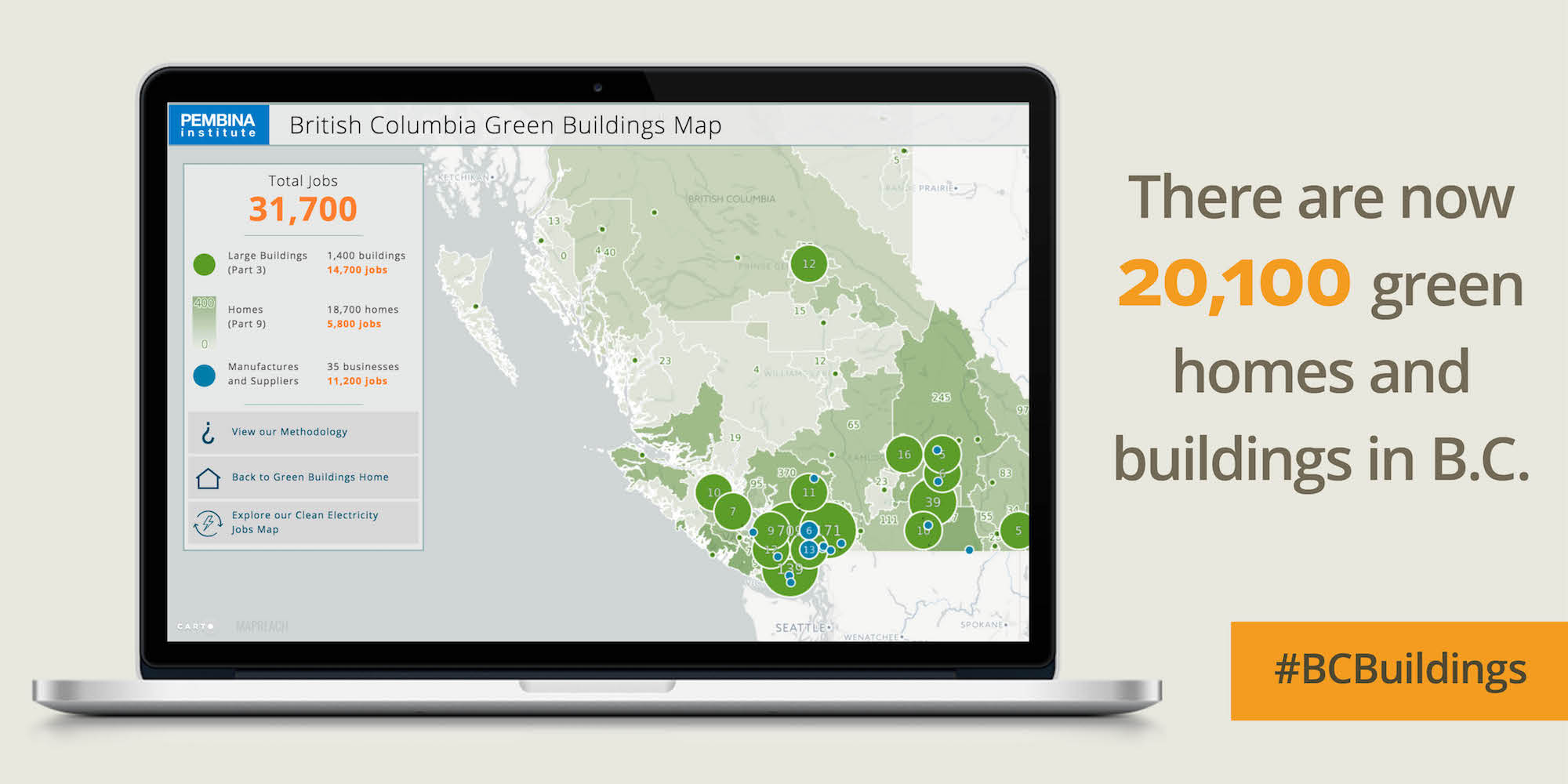VANCOUVER / COAST SALISH TERRITORY — The job-creating power of the green building sector, a key driver of the clean economy, continues to grow in British Columbia.
Today, the Pembina Institute released an update to the British Columbia Green Buildings Map, an interactive resource that quantifies the jobs in the industry and pinpoints where energy-efficient homes and buildings are located in the province.
The latest research pegs the number of jobs in the green building sector at 31,700 — up from the 23,200 counted when the map launched in 2015, mostly due to growth in larger projects. Meanwhile, the number of green buildings in the province has risen to 20,100, with more than 750 of these built in the last two years.
While construction of new green buildings is on the rise, jobs associated with energy-efficiency retrofits for existing buildings declined by one-third over the same period. This can be attributed, in part, to the ending of the LiveSmart B.C. rebate program for homeowners in 2014.
The Pembina Institute is calling on the new B.C. government to ensure the green building sector continues to thrive — by investing in programs that will accelerate the upgrading of our existing homes and buildings, and make constructing low-carbon, ultra energy-efficient buildings the norm.
A comprehensive strategy is needed to set a course for the building sector to help meet B.C.’s legislated 2050 climate target for carbon pollution.
Quick facts
- B.C.’s green building sector employs 31,700 people (directly and indirectly).
- 18,700 green homes and 1,400 large green buildings are located in the province.
- Energy use in buildings accounts for nearly a quarter of Canada’s carbon pollution.
- Living in an energy-efficient building can lower heating bills by more than 50%.
Quotes
“We are building our way to the clean growth economy in B.C. Along the way, we’ll create jobs, save energy and money, curb carbon pollution, and protect the climate.”
— Karen Tam Wu, acting B.C. director, Pembina Institute
“Investing in energy-efficient homes and buildings is a no-brainer. B.C. needs a renewed government commitment to retrofits for existing buildings, which will result in many benefits for British Columbians.”
— Karen Tam Wu, acting B.C. director, Pembina Institute
“There are now more than 20,000 green homes and buildings in every corner of the province, with more popping up every week. Healthier, more comfortable, and more affordable buildings are destined to become the new normal in our communities.”
— Dylan Heerema, analyst, Buildings and Urban Solutions Program, Pembina Institute
[30]
View the interactive map: British Columbia Green Buildings Map, 2017 edition
Join the conversation on Twitter: #BCBuildings @Pembina
Contact
Stephen Hui
Communications Lead, Pembina Institute
778-987-7654
stephenh@pembina.org
Tw: @StephenHui
Background
Report: Deep Emissions Reduction in the Existing Building Stock
Op-ed: B.C. municipalities ready to step up for better homes and buildings
Blog: Better homes, lower costs, less pollution: The Energiesprong model and B.C. buildings
Open letter: Time for Canada to lead the way to ultra energy-efficient buildings
About the Pembina Institute
The Pembina Institute is a non-profit think-tank that advocates for strong, effective policies to support Canada’s clean energy transition. We have offices in Vancouver, Calgary, Edmonton, and Toronto. Learn more: www.pembina.org






